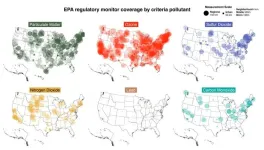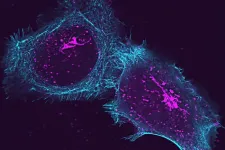(Press-News.org) Increased consumption of fruit, dietary fibre, dairy products and caffeine may be associated with a reduced risk of tinnitus (ringing in the ears), suggests an analysis of the available evidence, published in the open access journal BMJ Open.
The researchers stress that their findings can’t establish a direct (causal) relationship and should be interpreted with care because of the low quality of the evidence. But they say possible reasons may involve the protective effects of these diets on blood vessels and nerves, as well as their anti-inflammatory and antioxidant properties.
Tinnitus is the perception of sound (ringing, buzzing or clicking) when there’s no external source. Data suggests it affects around 14% of adults worldwide and is associated with depression, anxiety, stress, and in severe cases, suicide.
There is no cure, but treatments such as counselling, behavioral therapy, medications, and hearing aids can help to reduce symptoms.
Diet can also have a significant impact on tinnitus. It’s thought that eating high-quality nutrients can have a positive effect on hearing by improving blood flow to the inner ear and reducing oxidative damage and inflammation. But previous studies show conflicting results and it’s still uncertain which specific foods worsen or relieve symptoms.
To explore this further, the researchers trawled research databases looking for studies linking tinnitus and diet in adults published up to May 2024.
They found eight observational studies involving 301,533 people that assessed 15 dietary factors using validated questionnaires that were of suitable quality to include in their analysis.
The dietary factors included carbohydrates, caffeine, eggs, fruits, fibres, fat, meat, protein, sugar, fish, vegetables and dairy.
The combined findings revealed that increased consumption of fruit, dietary fibre, dairy products and caffeine was associated with a reduced occurrence of tinnitus. These reductions were 35% for fruit intake, 9% for dietary fibre, 17% for dairy products, and 10% for caffeine intake.
No associations were found between other dietary factors and tinnitus and results were consistent after further analyses, although the authors note that the association between caffeine intake and tinnitus remains contentious.
The authors acknowledge that due to the observational design of included studies, causality cannot be established, and the relatively small number of included studies may have led to certain conventionally accepted beneficial dietary factors (such as vegetables and eggs) not demonstrating significant differences.
However, they suggest that “the primary underlying mechanisms may involve the protective effects of these diets on blood vessels and nerves, as well as their anti-inflammatory and antioxidant properties” and say further large-scale studies are needed “to complement and verify the relationship between dietary intake and tinnitus.”
END
Increasing fruit, fiber, dairy and caffeine linked to lower risk of tinnitus
But quality of evidence low and further studies needed to verify the relationship, say researchers
2025-03-18
ELSE PRESS RELEASES FROM THIS DATE:
Does BMI become useless as we age?
2025-03-18
Body mass index (BMI) is key method for measuring a person’s weight status, and defining if they have normal weight, overweight, or obesity. However, new research to be presented at this year’s European Congress on Obesity (ECO 2025, Malaga, Spain, 11-14 May) shows that people with obesity at similar BMIs display significant differences in body composition in different body compartments according to their age group, such as higher body fat especially in central regions and lower muscle mass ...
Rice statistician earns $1 million CPRIT award to advance AI-powered precision medicine for prostate cancer
2025-03-18
HOUSTON – (March 18, 2025) – Erzsébet Merényi, a statistics research professor at Rice University, and co-investigators at The University of Texas MD Anderson Cancer Center Pratip Bhattacharya, professor of cancer systems imaging, and Dr. Patrick Pilié, assistant professor of genitourinary medical oncology, were awarded $1 million by the Cancer Prevention and Research Institute of Texas (CPRIT) to develop artificial intelligence (AI) tools that can identify lethal forms of prostate cancer earlier and improve treatment selection.
Prostate cancer ...
Whose air quality are we monitoring?
2025-03-18
U.S. Environmental Protection Agency (EPA) air quality monitors are disproportionally located in predominately white neighborhoods, according to University of Utah research. The EPA’s network consistently failed to capture air quality in communities of color across six major pollutants, particularly lead and sulfur dioxide, followed by ozone and carbon monoxide.
EPA regulatory monitors are the key data source driving decisions about pollution reduction, urban planning and public health initiatives. Without equal monitor distribution, the data may misrepresent pollution concentrations, leaving marginalized groups at risk.
“It’s ...
Team Hope rides (again) for cancer research at the Tour de Scottsdale
2025-03-18
For the second year in a row, Mayo Clinic physician Dr. Parminder Singh has organized a team of riders to raise funds for cancer research while tackling the 32- or 62-mile routes of the Tour de Scottsdale.
Singh is a clinical trialist with SWOG Cancer Research Network, a world-renowned organization leading cancer studies across the US and beyond. SWOG trials have led to the approval of 14 cancer drugs, changed more than 100 standards of cancer care, and saved more than 3 million years of human life.
Team Hope’s youngest rider is 11-year-old Misha Rajpal who will take on the full, ...
Researchers find missing link in autoimmune disorder
2025-03-18
Autoimmune diseases, which are estimated to affect more than 15 million people in the U.S., occur when the body responds to immune-system false alarms, and infection-fighting first responders are sent out to attack threats that aren’t there. Scientists have long understood how the false alarms get triggered, but the second step of dispatching the immune response has been a mystery.
Now, scientists at Washington University School of Medicine in St. Louis and the Perelman School of Medicine at the University of Pennsylvania ...
‘Democratizing chemical analysis’: FSU chemists use machine learning and robotics to identify chemical compositions from images
2025-03-18
TALLAHASSEE, Fla. — Florida State University chemists have created a machine learning tool that can identify the chemical composition of dried salt solutions from an image with 99% accuracy.
By using robotics to prepare thousands of samples and artificial intelligence to analyze their data, they created a simple, inexpensive tool that could expand possibilities for performing chemical analysis. The work was published in Digital Discovery.
“We are living in the age of artificial intelligence and big data,” ...
Leveraging data science for disease prediction in the fight against rheumatoid arthritis
2025-03-18
Fan Zhang, PhD, sees artificial intelligence as a pathway to finding an effective way to combat an intractable enemy: rheumatoid arthritis.
Zhang is an assistant professor in the University of Colorado Department of Medicine’s Division of Rheumatology and also is affiliated with the Department of Biomedical Informatics on the CU Anschutz Medical Campus. She recently received a highly competitive grant from the Arthritis Foundation to further her work in harnessing AI to better predict the onset of rheumatoid arthritis (RA) in particular patients, ...
Kennedy Krieger screening model improves early autism diagnosis for underserved communities
2025-03-18
BALTIMORE, March 18, 2025— A new study led by Kennedy Krieger Institute’s Center for Autism Services, Science and Innovation (CASSI) finds that a community-based screening model is helping children receive autism diagnoses faster, particularly in underserved communities.
The research, published in Pediatric Investigation, highlights how the Rapid Interactive Screening Test for Autism in Toddlers (RITA-T) is making early autism identification more accessible for families facing barriers to care. RITA-T is a quick, interactive tool that assesses developmental skills often delayed in autism, such as social engagement, ...
Blood pressure patterns during pregnancy predict later hypertension risk, study finds
2025-03-18
Women with blood pressure levels in a range considered clinically normal during pregnancy but no mid-pregnancy drop in blood pressure face an increased risk of developing hypertension in the five years after giving birth. These women—about 12% of the population studied—would not be flagged as high-risk by current medical guidelines, but the new findings could help identify them as candidates for early intervention. The findings were just published in the Journal of the American College of Cardiology: Advances.
Funded in part by the National Institutes of Health, researchers collected data on blood pressure and other health factors ...
Latest Alzheimer’s drug shown less effective in females than males
2025-03-18
Since becoming only the second Alzheimer’s-modifying drug to gain American Federal Drug Administration approval in 2023, sales of lecanemab, known by its brand name Leqembi, have risen steadily, reaching $87-million USD in the last quarter of 2024.
In its Phase 3 clinical trial, lecanemab slowed cognitive decline by 27 per cent overall, yet one subset of data suggested little to no benefit in females, though the cause of the difference was not clear. An FDA committee voted unanimously that the Phrase 3 trial verified the clinical benefit of lecanemab. Even so, several follow-up papers focused on the trial’s apparent sex difference result to cast doubt on ...
LAST 30 PRESS RELEASES:
When safety starts with a text message
CSIC develops an antibody that protects immune system cells in vitro from a dangerous hospital-acquired bacterium
New study challenges assumptions behind Africa’s Green Revolution efforts and calls for farmer-centered development models
Immune cells link lactation to long-lasting health
Evolution: Ancient mosquitoes developed a taste for early hominins
Pickleball players’ reported use of protective eyewear
Changes in organ donation after circulatory death in the US
Fertility preservation in people with cancer
A universal 'instruction manual' helps immune cells protect our organs
Fifteen-year results from SWOG S0016 trial suggest follicular lymphoma is curable
The breasts of a breastfeeding mother may protect a newborn from the cold – researchers offer a new perspective on breast evolution
More organ donations now come from people who die after their heart stops beating
How stepping into nature affects the brain
Study: Cancer’s clues in the bloodstream reveal the role androgen receptor alterations play in metastatic prostate cancer
FAU Harbor Branch awarded $900,000 for Gulf of America sea-level research
Terminal ileum intubation and biopsy in routine colonoscopy practice
Researchers find important clue to healthy heartbeats
Characteristic genomic and clinicopathologic landscape of DNA polymerase epsilon mutant colorectal adenocarcinomas
Start school later, sleep longer, learn better
Many nations underestimate greenhouse emissions from wastewater systems, but the lapse is fixable
The Lancet: New weight loss pill leads to greater blood sugar control and weight loss for people with diabetes than current oral GLP-1, phase 3 trial finds
Pediatric investigation study highlights two-way association between teen fitness and confidence
Researchers develop cognitive tool kit enabling early Alzheimer's detection in Mandarin Chinese
New book captures hidden toll of immigration enforcement on families
New record: Laser cuts bone deeper than before
Heart attack deaths rose between 2011 and 2022 among adults younger than age 55
Will melting glaciers slow climate change? A prevailing theory is on shaky ground
New treatment may dramatically improve survival for those with deadly brain cancer
Here we grow: chondrocytes’ behavior reveals novel targets for bone growth disorders
Leaping puddles create new rules for water physics
[Press-News.org] Increasing fruit, fiber, dairy and caffeine linked to lower risk of tinnitusBut quality of evidence low and further studies needed to verify the relationship, say researchers



